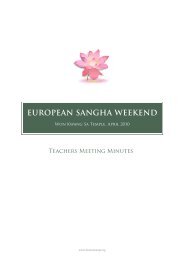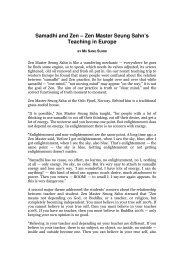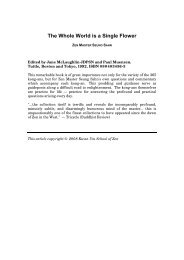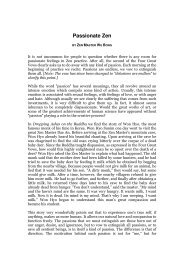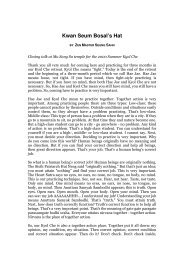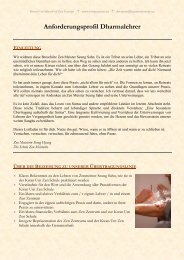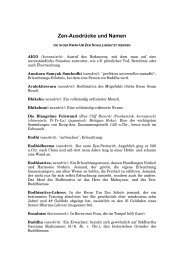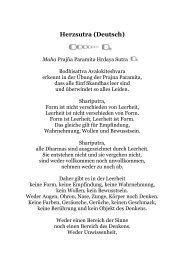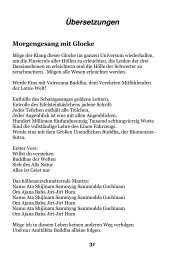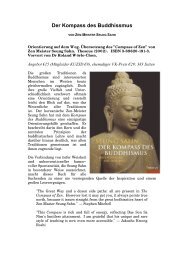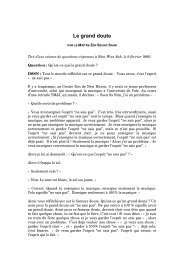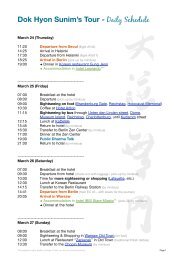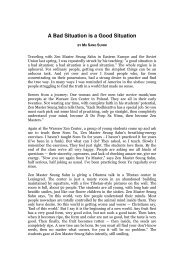Only Keep "Don't Know" Mind - Kwan Um School of Zen Europe
Only Keep "Don't Know" Mind - Kwan Um School of Zen Europe
Only Keep "Don't Know" Mind - Kwan Um School of Zen Europe
Create successful ePaper yourself
Turn your PDF publications into a flip-book with our unique Google optimized e-Paper software.
kimchee (Korean): spicy pickled cabbage.<br />
kong-an (Korean; Japanese: koan): a paradoxical or irrational statement<br />
used by <strong>Zen</strong> teachers to cut through students' thinking and bring them to<br />
realization.<br />
<strong>Kwan</strong> Seum Bosal (Korean; Sanskrit: Avalokitesvara; Chinese: <strong>Kwan</strong> Yin;<br />
Korean: <strong>Kwan</strong> <strong>Um</strong>; Japanese: Kanzeon): "one who perceives the cries <strong>of</strong> the<br />
world" and responds with compassionate aid; the bodhisattva <strong>of</strong> compassion.<br />
Kyol Che (Korean): "tight dharma"; in Korean <strong>Zen</strong> tradition, an intensive<br />
retreat <strong>of</strong> 21 to 90 days.<br />
Lin Chi (d. 866 CE) (Chinese): Chinese <strong>Zen</strong> Master; founder <strong>of</strong> the Lin-chi<br />
(Rinzai) school <strong>of</strong> <strong>Zen</strong>, one <strong>of</strong> the two schools still active in Japan.<br />
Mahakashyapa (Sanskrit): outstanding student <strong>of</strong> the Buddha. Buddha's<br />
successor in leading the sangha.<br />
Mahayana (Sanskrit) Buddhism: the Buddhism practiced in northern Asia;<br />
encompasses schools in China, Korea, Japan, and Tibet.<br />
Ma Jo (709-788 CE) (Korean; Chinese: Ma-tsu): the great patriarch <strong>of</strong><br />
Chinese <strong>Zen</strong> during the early T'ang period.<br />
mala: see beads<br />
mantra (Sanskrit): sounds or words used in meditation to cut through<br />
discriminating thoughts so the mind can become clear.<br />
moktak (Korean): fish-shaped wooden instrument used as a drum to set the<br />
rhythm for chanting.<br />
mu (Japanese): nothing, not, nothingness.<br />
Mu Mun <strong>Kwan</strong> (Korean): "The Gateless Gate"; a collection <strong>of</strong> forty-eight<br />
traditional kong-an cases composed in 1228 by the monk Mu Mun Ekai (1184-<br />
1260); usually studied before the Blue Cliff Record.<br />
nirvana (Sanskrit): a state <strong>of</strong> perfect inner stillness and peace; complete<br />
extinction <strong>of</strong> individual existence; cessation <strong>of</strong> rebirth; entry into bliss.<br />
paramita (Sanskrit): virtues or "perfections" <strong>of</strong> a Buddha. In Mahayana<br />
Buddhism, these are the six paramitas: dana (generosity), sila (restraint or<br />
morality), shanti (patience), vigor (energy or effort), dhyana (meditation),<br />
prajna (wisdom).<br />
patriarch: the founder <strong>of</strong> a school and his successors in the transmission <strong>of</strong><br />
its teaching.



